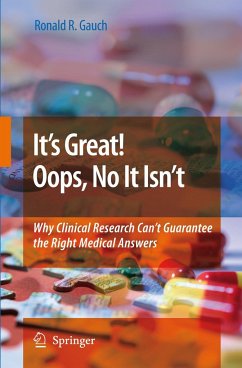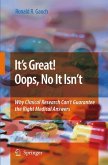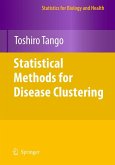This book dissects the methods behind the triumphs and tragedies of medical research to fully explore why doctors and researchers are so often wrong. Written for the lay person, it pays particular attention to the "clinical trial" and its seven fatal flaws.
The truth is, few people know the first thing about clinical research. The public reads about a medical research project that announces unbelievable results for a miraculous drug. Some years later, another investigation completely wipes out those initial favorable findings. Hormones Cut Women's Risk of Heart Disease (San Francisco Chronicle, 1994) Hormones Don't Protect Women from Heart Disease, Study Says (Washington Post, 2001) The people are confused because we do not understand the process behind these conflicting results. Our health, and in fact, our very lives are dependent on clinical trials, but we know little about them. This book explains the issues the public needs to be aware of when it comes to clinical research. It uncovers the problems in medical investigations that can not be overcome no matter how much care and diligence medical researchers bring to a research project. The basic premise that drives the writing is that it is impossible for medical researchers to guarantee that they can get all the right answers from a single study. No matter how good the investigators are, no matter how well a study is planned, no matter how carefully the plans are executed and no matter how conscientiously the results are analyzed and interpreted - the answer may still be wrong. The deck is stacked against medical researchers and the public - you - should be skeptical of the results no matter how impressive they seem on the surface.
The truth is, few people know the first thing about clinical research. The public reads about a medical research project that announces unbelievable results for a miraculous drug. Some years later, another investigation completely wipes out those initial favorable findings. Hormones Cut Women's Risk of Heart Disease (San Francisco Chronicle, 1994) Hormones Don't Protect Women from Heart Disease, Study Says (Washington Post, 2001) The people are confused because we do not understand the process behind these conflicting results. Our health, and in fact, our very lives are dependent on clinical trials, but we know little about them. This book explains the issues the public needs to be aware of when it comes to clinical research. It uncovers the problems in medical investigations that can not be overcome no matter how much care and diligence medical researchers bring to a research project. The basic premise that drives the writing is that it is impossible for medical researchers to guarantee that they can get all the right answers from a single study. No matter how good the investigators are, no matter how well a study is planned, no matter how carefully the plans are executed and no matter how conscientiously the results are analyzed and interpreted - the answer may still be wrong. The deck is stacked against medical researchers and the public - you - should be skeptical of the results no matter how impressive they seem on the surface.
From the reviews:
"Written by someone well versed in the complexities of biomedical research, this easy to understand book provides valuable information on the difficulty of finding the truth about drug safety and efficacy. (Dr.) Gauch has done us all a great service by explaining in a lucid and insightful manner why we need to be cautious in interpreting the results of preliminary, unconfirmed, or less than definitive clinical trials. This book is must reading not only for those involved in biomedical research, health care professionals, students and disease related society members but for the general public as well." (Stuart D. Cook, M.D. Past President, University of Medicine and Dentistry of New Jersey - currently the Ruth Dunietz Kushner and Michael Jay Serwitz Professor of Neurology and Neurosciences at the University)
Press Release:
Heidelberg, 8 October 2008
It's Great! Oops, No It Isn't
New book explains why correct answers in medical research are so hard to achieve
The truth is, few people know the first thing about clinical research. The public reads about a medical research project that announces unbelievable results for a miraculous drug. Some years later, another investigation completely wipes out those initial favorable findings. For example, a 1994 headline in the San Francisco Chronicle announced "Hormones cut women's risk of heart disease" but by 2001 that optimistic report was reversed as evidenced by a Washington Post article titled, "Hormones don't protect women from heart disease."
People are confused because they do not understand the process behind these conflicting results. A new book can help - It's Great! Oops, No It Isn't: Why Clinical Research Can't Guarantee The Right Medical Answers by Ronald Gauch dissects medical research methodology. Through a penetrating inquiry into its triumphs and tragedies, it explains why correct answers are so hard toachieve. What emerges from this inquiry is the unexpected and stunning conclusion that medical researchers can never be sure that they've ended up with a truthful answer. Gauch shows readers why the quest for knowledge through clinical trials is fraught with problems that even the best researchers cannot overcome.
A fascinating gallery of cases illustrates the perils investigators face. Particular emphasis is given to the "clinical trial," the so-called gold standard for medical research. Its seven fatal flaws show succinctly why getting the right research answer is so problematic. In example after example, the author challenges the notion that medical research is too complex for the average citizen to comprehend.
Understanding the imperfect world of clinical research allows the reader to step up and begin to ask his or her own questions, to challenge conclusions, to have doubts and not be afraid to raise them. People who care about their health and the health of others should not be innocent bystanders. They have a right, maybe even an obligation, to become involved. After all, it's their health that is at stake.
Ronald Gauch, Ph.D., spent most of his adult life involved in the application of research methods to clinical investigations. He has been a primary player in important medical studies of major pharmaceutical companies. He has also seen the research world from the academic side at Marist College. He is an excellent presenter, winner of a number of speaking competitions and awarded best teacher recognition on two occasions while at Marist College. As a consultant to the pharmaceutical and healthcare industries, and working with a number of local health-related organizations, he is involved with both the academic and practical world of medical research.
The author is available for interview.
Ronald R. Gauch
It's Great! Oops, No It Isn't
Why Clinical Research Can't Guarantee The Right Medical Answers
2008. XIV, 298 pages.
Hardcover EUR39.95, $59.95, £31.99
ISBN 978-1-4020-8906-0
Contact:
Joan Robinson
tel +49-6221-4878130 (Germany)
"It's Great!Oops, No It Isn't offers a behind-the-study look at how medical research is actually conducted, from the first protocol design to publication of the results. ... Gauch's book should be a must-read for anyone considering participating in a clinical trial." (Miller-McCune Turning Research into Solutions, March, 2009)
"Written by someone well versed in the complexities of biomedical research, this easy to understand book provides valuable information on the difficulty of finding the truth about drug safety and efficacy. (Dr.) Gauch has done us all a great service by explaining in a lucid and insightful manner why we need to be cautious in interpreting the results of preliminary, unconfirmed, or less than definitive clinical trials. This book is must reading not only for those involved in biomedical research, health care professionals, students and disease related society members but for the general public as well." (Stuart D. Cook, M.D. Past President, University of Medicine and Dentistry of New Jersey - currently the Ruth Dunietz Kushner and Michael Jay Serwitz Professor of Neurology and Neurosciences at the University)
Press Release:
Heidelberg, 8 October 2008
It's Great! Oops, No It Isn't
New book explains why correct answers in medical research are so hard to achieve
The truth is, few people know the first thing about clinical research. The public reads about a medical research project that announces unbelievable results for a miraculous drug. Some years later, another investigation completely wipes out those initial favorable findings. For example, a 1994 headline in the San Francisco Chronicle announced "Hormones cut women's risk of heart disease" but by 2001 that optimistic report was reversed as evidenced by a Washington Post article titled, "Hormones don't protect women from heart disease."
People are confused because they do not understand the process behind these conflicting results. A new book can help - It's Great! Oops, No It Isn't: Why Clinical Research Can't Guarantee The Right Medical Answers by Ronald Gauch dissects medical research methodology. Through a penetrating inquiry into its triumphs and tragedies, it explains why correct answers are so hard toachieve. What emerges from this inquiry is the unexpected and stunning conclusion that medical researchers can never be sure that they've ended up with a truthful answer. Gauch shows readers why the quest for knowledge through clinical trials is fraught with problems that even the best researchers cannot overcome.
A fascinating gallery of cases illustrates the perils investigators face. Particular emphasis is given to the "clinical trial," the so-called gold standard for medical research. Its seven fatal flaws show succinctly why getting the right research answer is so problematic. In example after example, the author challenges the notion that medical research is too complex for the average citizen to comprehend.
Understanding the imperfect world of clinical research allows the reader to step up and begin to ask his or her own questions, to challenge conclusions, to have doubts and not be afraid to raise them. People who care about their health and the health of others should not be innocent bystanders. They have a right, maybe even an obligation, to become involved. After all, it's their health that is at stake.
Ronald Gauch, Ph.D., spent most of his adult life involved in the application of research methods to clinical investigations. He has been a primary player in important medical studies of major pharmaceutical companies. He has also seen the research world from the academic side at Marist College. He is an excellent presenter, winner of a number of speaking competitions and awarded best teacher recognition on two occasions while at Marist College. As a consultant to the pharmaceutical and healthcare industries, and working with a number of local health-related organizations, he is involved with both the academic and practical world of medical research.
The author is available for interview.
Ronald R. Gauch
It's Great! Oops, No It Isn't
Why Clinical Research Can't Guarantee The Right Medical Answers
2008. XIV, 298 pages.
Hardcover EUR39.95, $59.95, £31.99
ISBN 978-1-4020-8906-0
Contact:
Joan Robinson
tel +49-6221-4878130 (Germany)
"It's Great!Oops, No It Isn't offers a behind-the-study look at how medical research is actually conducted, from the first protocol design to publication of the results. ... Gauch's book should be a must-read for anyone considering participating in a clinical trial." (Miller-McCune Turning Research into Solutions, March, 2009)
Aus den Rezensionen: "... Was nach trockenem Lehrbuch klingt, wird ... anschaulich mit vielen Beispielen erläutert. Die einzelnen Kapitel sind für sich verständlich und die speziellen Fachbegriffe werden grundlegend erklärt. Ein Buch für Einsteiger in die klinische Forschung und alle, die sich dafür interessieren, wie die Aussagen von klinischen Studien zu bewerten sind, die alltäglich publiziert und zitiert werden." (in: BioRegioN newsletter, 2009, Issue 1, S. 21)








